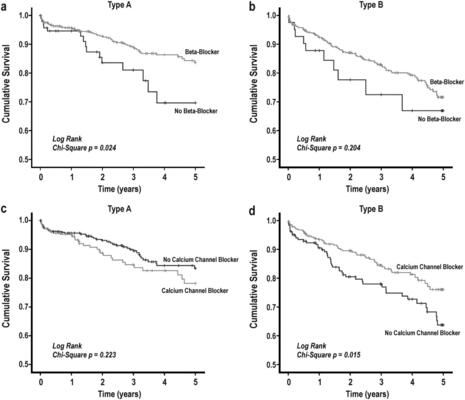Thoracic Aorta
Type-Selective Benefits of Medications in Treatment of Acute Aortic Dissection (from the International Registry of Acute Aortic Dissection [IRAD])
Evidence Ranking
• C
Expert Rating
• 2
Abstract
The effects of medications on the outcome of aortic dissection remain poorly understood. We sought to address this by analyzing the International Registry of Acute Aortic Dissection (IRAD) global registry database. A total of 1,301 patients with acute aortic dissection (722 with type A and 579 with type B) with information on their medications at discharge and followed for ≤5 years were analyzed for the effects of the medications on mortality. The initial univariate analysis showed that use of β blockers was associated with improved survival in all patients (p = 0.03), in patients with type A overall (p = 0.02), and in patients with type A who received surgery (p = 0.006). The analysis also showed that use of calcium channel blockers was associated with improved survival in patients with type B overall (p = 0.02) and in patients with type B receiving medical management (p = 0.03). Multivariate models also showed that the use of β blockers was associated with improved survival in those with type A undergoing surgery (odds ratio 0.47, 95% confidence interval 0.25 to 0.90, p = 0.02) and the use of calcium channel blockers was associated with improved survival in patients with type B medically treated patients (odds ratio 0.55, 95% confidence interval 0.35 to 0.88, p = 0.01). In conclusion, the present study showed that use of β blockers was associated with improved outcome in all patients and in type A patients (overall as well as in those managed surgically). In contrast, use of calcium channel blockers was associated with improved survival selectively in those with type B (overall and in those treated medically). The use of angiotensin-converting enzyme inhibitors did not show association with mortality (Figs 1 and 2).
Stay updated, free articles. Join our Telegram channel

Full access? Get Clinical Tree



